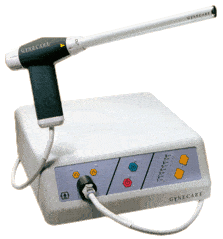
Johnson & Johnson has suspended sales worldwide of the power morcellator, a device used in uterine fibroid surgery, amid concerns over its potential to spread undetected cancer beyond the uterus. The company is suspending the sale of these devices until their role in fibroid treatment is better understood and redefined by the medical community, Reuters […]
 Johnson & Johnson has suspended sales worldwide of the power morcellator, a device used in uterine fibroid surgery, amid concerns over its potential to spread undetected cancer beyond the uterus.
Johnson & Johnson has suspended sales worldwide of the power morcellator, a device used in uterine fibroid surgery, amid concerns over its potential to spread undetected cancer beyond the uterus.
The company is suspending the sale of these devices until their role in fibroid treatment is better understood and redefined by the medical community, Reuters reports. The action comes after the Food and Drug Administration (FDA) issued an advisory discouraging doctors from using laparoscopic power morcellators to remove fibroids because of a risk of spreading an often-hidden cancer. In a letter to customers, J&J wrote, “Ethicon morcellation devices have always included cautions in their instructions for use about the potential spread of malignant tissue.” Ethicon is the division that makes morcellators.
The power morcellation procedure involves cutting tissue into pieces that can be removed through the tiny incisions made during minimally invasive surgery, The New York Times reports. But FDA data indicates that approximately one in every 350 women with fibroids could have a uterine sarcoma and slicing up the cancerous tissue before removal could allow cancer to spread in the patient’s abdomen, reducing the patient’s long-term survival rate, according to Law360. The Times explains that surgeons are taught to remove cancers or potentially cancerous tissue whole to avoid spreading the disease.
Dr. William Maisel, deputy director for science and chief scientist at the FDA’s Center for Devices and Radiological Health, said there is “no reliable way to determine if a uterine fibroid is cancerous prior to removal,” and therefore the FDA “is discouraging the use of laparoscopic power morcellation,” according to Law360
Though the FDA did not remove power morcellators from the market, it urged doctors to consider other treatment methods for symptomatic fibroids. Power morcellation may still be the best treatment option for some patients, after careful risk evaluation with their doctors.


